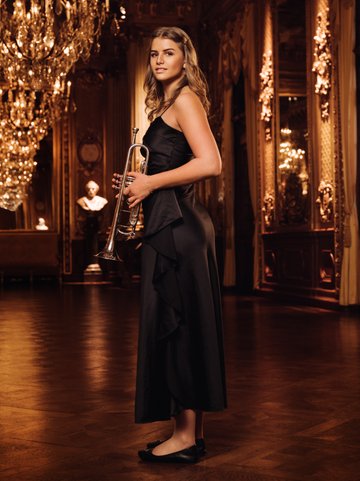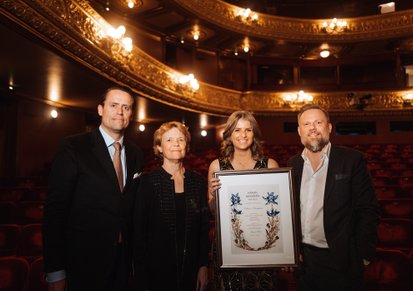2022 Music Prize
Ellinor Bengtson is awarded for playful brilliance
The Mogren Music Prize 2022 is awarded to the 18-year-old trumpeter Ellinor Bengtson. The prize of SEK 125,000 is motivated by a creativity and technique that already belongs to a fully developed artist rather than a promising teenager.
“A strong arts sector is so important, not the least because of the unique spaces it creates for different thoughts and feelings to meet. Ellinor is an impressive example of the creative and technical range found in young musicians, that is so important to support", says Professor Harriet Wallberg, Chair of Mogren Foundation.
"Music turns into the language we all understand, no matter your origin. Some notes have the ability to illustrate your meaning when you lack the words, and translate a feeling you cannot express in other ways. I am so grateful for that community."
Ellinor Bengtson
Jury motivation
”Ellinor Bengtson has taken the step from being an exceptionally promising student to an artist of emerging mastery. She has a playful brilliance and it is hard to believe that she is only 18.”
Notes can explain what we do not understand
She was spellbound by the notes of the trumpet already as a three-year-old. At the age of 18, Ellinor Bengtson is an award-winning trumpeter with music as her primary language, in love with live music’s effect on the audience. The 2022 Mogren Music Prize winner wants the listener to experience joy as well as reassurance.
“My parents have told me how I, as a three-year-old, saw a small trumpet displayed on the neighbour’s wall. I wouldn’t stop until they took it down, whereupon I drew a deep breath, and apparently hit a stellar note from the onset! The sound must have left an impression on me, because I’ve been playing since then.”
As a small girl, Ellinor Bengtson was surrounded by music, with an opera-singing grandmother, who gathered all the grandchildren in a choir, a father who to this day is a flautist in the Royal Stockholm Philharmonic Orchestra, and relatives who together sang old quartets during mealtime. The trumpet is, however, a bit of a break of tradition.
“My younger brother, father, grandfather, and great-grandfather all played the flute. For me to suddenly decide to play the trumpet is really rather strange. Perhaps I realised we needed some brass,” Ellinor laughs.
At the age of 18, she has already played some of the major stages with artists such as the Royal Stockholm Philharmonic Orchestra, the Benny Andersson Orchestra, Malena Ernman, Tommy Körberg, and Molly Sandén.
“The Covid pandemic exposed how important music is to people. Being on a stage is different in the aftermath, bringing up more feelings. I am able, through the trumpet, to make an audience feel both sorrow and reassurance, which is an incredible feeling and always makes my whole body tingle. I am constantly looking forward to the next time I can be on stage.”
The emotional bond she experiences with the audience received yet another dimension when she moved abroad to study at an elite level. At the Royal Academy of Music in London, the understanding is heightened that music is not just notes but rather a missing language.
“The students are all from different corners of the world, and music turns into the language we all understand, no matter your origin. Some notes have the ability to illustrate your meaning when you lack the words, and translate a feeling you cannot express in other ways. I am so grateful for that community.”
Despite attending the music school Lilla Akademin from age five to graduation, it was not always clear that she would continue playing the trumpet.
“Nothing is fun all the time, not even the trumpet. In middle school, I was really sick of it and wondered if I shouldn’t have chosen a different instrument after all. I tried new things, but never stopped practicing. Even if it was an hour doing tedious scales, I did it every day. After a while I found my way back and remembered the joy from standing on a stage with that trumpet.”
Ellinor is particularly fond of improvisation and is known for her lively playing.
“Improvising on a trumpet is difficult. You need to know where you are heading before you start for you to become one with the instrument. It is incredibly fun and hard not to do it, though,” Ellinor says.
Today, Ellinor is completely convinced that she wants to be a musician in the future. Looking ahead, she sees a cascade of expressions she would like to try.
“I don’t have a plan, I want to try all of it! Be a member of an orchestra, freelance with jazz, funk, or pop bands, and do solo gigs. Sometimes it worries me that it’s so competitive, but there are many living examples of the possibility of making music into a career. My own family, for example. If they can do it, so can I! I’ll just have to apply myself until I make it.”
For anyone else who is inspired to join the music sector, Ellinor says the most important thing is to follow your heart and gut.
“Sometimes, you just need a bit of encouragement, which I can give to those who are reading this now – if you set your mind to it, you will make it! But remember that it’s also okay not to know exactly what you want to do. Be brave enough to try different things until you find what you like best. I’m happy I took the time for reflection along the way. That showed me what it is that makes me happy.”
About Ellinor Bengtson
Ellinor had a distinguished solo performance with the Royal Stockholm Philharmonic Orchestra during the 2022 annual opening of the Parliamentary Session in Konserthuset Stockholm. She also came in second place in the Music International Grand Prix, was the youngest band member on tour with the Benny Andersson Orchestra, and played with artists such as Malena Ernman, Tommy Körberg, and Molly Sandén.
She started playing the trumpet as a three-year-old and attended the music school Lilla Akademin from age five until graduation, receiving instructions from the Royal Swedish Orchestra trumpeter Jonas Palsten.
As of 2022, she is a student at the Royal Academy of Music in London, studying under Professor Mark David and visiting professor Jeroen Berwaerts.



